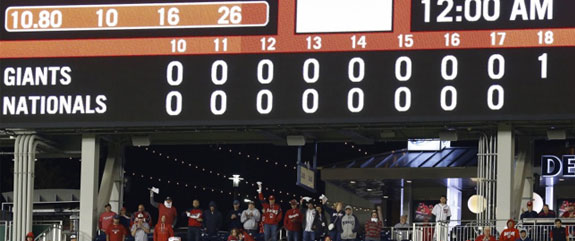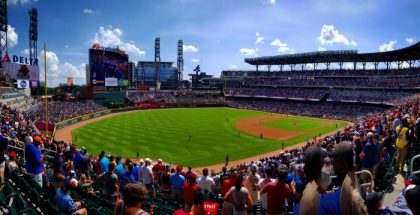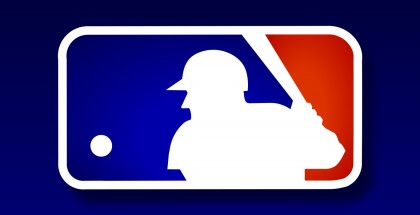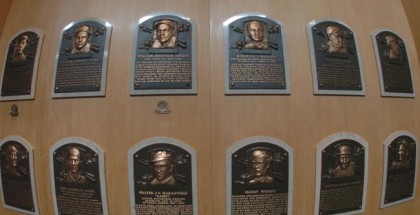I sat through six and a half hours of baseball, and all I got was this crummy Nationals column.
By the 16th inning, I was getting pretty cold. My wife and I were in the midst of experiencing what was about to become the longest postseason game in baseball history. Sitting in the third row from the top at Nationals Park, we watched as trio after trio of Washington batters made outs. Occasionally, the home team would manage to get a runner or two on base, but any such rallies were short-lived. The bats that comprised the National League’s second-most potent offense (outside of Colorado) during the regular season were nowhere to be found.
It was clear that the end of the game would come when one team managed to hit a ball over the wall – as if a moratorium on run manufacturing had gone into effect somewhere around hour four. Brandon Belt did the trick for the Giants in the top of the eighteenth – there was no doubt once the ball left his bat. Despite one final, fruitless Washington rally in the bottom of the inning, the writing was on the wall as soon as Belt’s blast cleared the fence – for the game and the series. Once Jayson Werth recorded the final out, the remaining Nationals fans shuffled out of the ballpark with varying mixes of disappointment and relief nearly six and a half hours after the first pitch.
I’ve recently written in this space about my evolving baseball loyalties, and the experience of sitting through what amounted to two full games of Nationals playoff baseball was certainly unique. The Nationals had dropped the first game of the series at home, so a sense of foreboding was present in the park from the first pitch. Without any offense to feed off of throughout the game, the crowd rarely came to life, despite a magnificent pitching performance by Jordan Zimmermann.
The most striking trend of the evening was the way that the crowd’s involvement and passion improved as its numbers diminished throughout the extra innings. Fans started heading for the exits after the eighth inning, and continued to leave as the game wore on. As the less devoted fans headed home, the cheering among the remaining fans was concentrated, and the stadium seemed louder in an absolute sense throughout the extra innings, as the remaining fans became more desperate.
DC is, in general, a weird sports town. The Nationals, in particular, have a unique fan base. The team has only been here for a decade or so, so my wife, whose first loyalty was to the Orioles, is about the closest thing the franchise has to a homegrown adult fan. Added to that equation are the massive number of transplants who live in the DC area (such as myself – the exiled Cub fan). People care about the Nationals to be sure, but DC does not build a mythology around what it means to be a Nationals fan. Baseball, with a capital B, is allowed to be baseball, in the lowercase. If you are cold in the fourteenth inning of a(n objectively boring) game in October, you go home – you don’t worry about what your departure from the ballpark says about you as a fan, or the Nationals fan base as a whole.
Coming from Chicago, where devotion to the Cubs frequently borders on religious fanaticism, this seemed bizarre to me. It’s a nice arrangement, however – it’s all upside for me with the Nationals. An 18-inning, playoff loss for “my team” that doesn’t cause me to tear out any of my hair is probably a healthy thing – I have enough falling out on its own in any case.







Submit a Comment